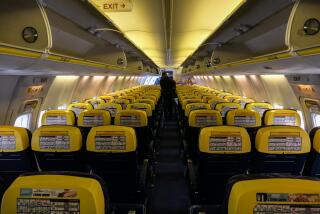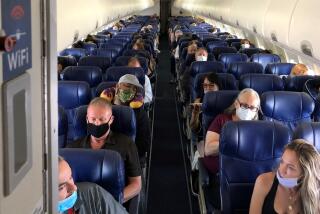Mandatory Airline Safety Seats for Infants Urged by Attendants
Saying there is no safe way to hold a baby on an airliner, the Assn. of Flight Attendants asked the federal government Friday to require the use of automobile safety seats for infants on aircraft.
The action followed the American Medical Assn.’s endorsement earlier this week of an “approved child restraint” for aircraft use.
The issue of infant safety has gained attention since a baby was killed in July’s crash of a United Airlines jumbo jetliner near Sioux City, Iowa. The infant had been traveling on his mother’s lap.
The Federal Aviation Administration permits children under age 2 to sit on laps and fly for no charge, but safety experts contend that babies who do so are not safe. Inertial forces build in a crash, experts say, making even a small child almost impossible to hold.
FAA officials are reviewing their rules in response to a petition from the Los Angeles Area Child Passenger Safety Assn., which wants the agency to mandate the use of safety seats. The FAA, which has not indicated how it will respond, permits automobile safety seats to be used on airliners but does not require them.
The airline industry is opposed to mandatory use of the seats. The industry says that it would be costly and difficult to supply them and adds that some safety seats are so bulky that they block aircraft aisles, creating a possible evacuation hazard. Industry representatives have asked the FAA to develop a special child-restraint system for aircraft.
However, the airlines support the voluntary use of safety seats.
But, despite the drawbacks, the flight attendants’ union wants the FAA to require use of automobile safety seats until a better child-restraint system is found.
However, the AMA has taken a more moderate position. Dr. Alan R. Nelson of Salt Lake City, the association’s president, said that the group offered to help the FAA design a child-restraint system specifically for airliners.
Nelson said that the AMA opposed the mandatory use of automobile safety seats because it would be expensive for airlines to supply a device that might quickly become outdated for air travel. He added that requiring the use of automobile safety seats would make family travel more costly, because infants then would need their own tickets.
More to Read
Inside the business of entertainment
The Wide Shot brings you news, analysis and insights on everything from streaming wars to production — and what it all means for the future.
You may occasionally receive promotional content from the Los Angeles Times.







